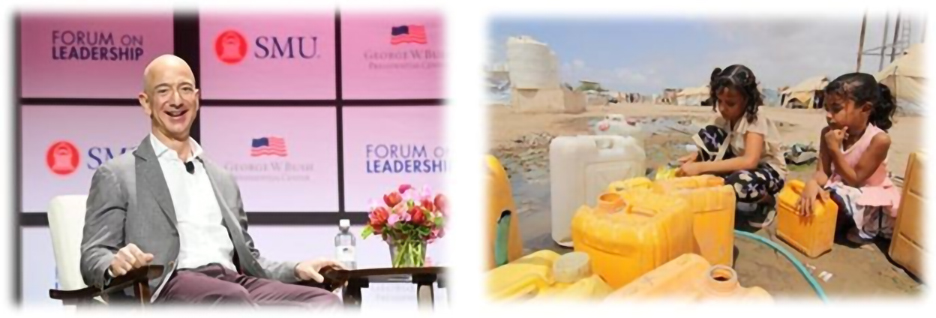
Rich vs. Poor: The Next Pandemic?
The dichotomy that is plaguing the world
By Alanah Coulson
The covid-19 pandemic has brought an abundance of things to light; brightest of all being the raging divide between the rich and poor. Not only have healthcare systems become crippled, but so too the economy – with many of the world’s population unfortunately bearing the brunt of this storm.
Nowhere has it been hit harder than in Yemen. A raging civil war, famine and now a pandemic to attend to. Even before today’s pressing crisis the state of Yemen was beyond alarming, but it is now reported 24 million Yemenis (80% of the population) require aid in order to survive and 2 million children are severely malnourished. As of July 2020, some of this vital life line had diminished with only 18% of monetary funds having been received. This life and death dilemma extends onwards to the state of decay seen among the Yemini health care system. Years of war that predated the pandemic had grated away at this already paper thin health care system – but it is now close to a full scale collapse. Air strikes have destroyed 3500 medical facilities, 23% are no longer functional and staff are being murdered. The lack of personal protective equipment for medical staff may seem minimal when compared to being the target for a missile – yet is also adding to the never ending list of death.
By comparison, life seems extremely comfortable at the top; $177.9 billion dollars’ worth of comfort in fact. The world’s wealthiest man Jeff Bezos has been gifted by the pandemic this year, with Amazon stocks going up by nearly 80% from the start of 2020. Bezos’ wealth is incomprehensible – but to put it into perspective – it is seven times more than Yemen’s expected $24.80 billion GDP and can even surpass the combined wealth of multiple countries; with Jamaica, Iceland, Tunisia, and Estonia serving as examples. It doesn’t take much to paint how expansive the gap between the rich and poor persists globally when shifting focus upwards to the top echelons of this world.
A moral question remains; how can one man hold such vast riches whilst so many of the world scrape the bottom of the barrel just to stay alive? Bezos does not stand alone with this one – there are 2000 billionaires worldwide with a combined net worth of eight trillion dollars. Thinking optimistically, such mass greed does have the potential to heal global inequalities. As stated by the UN’s David Beasley, who called for intervention from the world’s billionaires in order to save 30 million people dying from hunger this year. Just over four billion dollars is required to keep this huge population of people afloat – a measly sum for the 1% to collectively contribute. Many have donated towards aiding the pandemic; Bill Gates has given more than $300 million so far – and Bezos $150 million. Ironically however, if Bezos was the average american his donation would only translate to $85.
Of the 2000 worldwide billionaires, America takes top spot – with 12 billionaires and a combined net worth of $1 trillion. Interestingly, there’s no need to specifically look as far as Yemen or the third world for crisis; Bezos’ backyard is also dilapidated. One of the world’s most powerful nations ironically doesn’t quite pack the punch it suggests. Behind the smoke screen of multiplying dollars you’ll find the average american bound to perpetuating debts, vast medical bills and now potential homelessness tag tailing along. Without doubt the pandemic has exacerbated these events. Across the states an estimated 550,000 people are homeless; becoming some of the most vulnerable facing the pandemic. However, a roof to sleep under doesn’t even ensure the average american a fair distance from instability. One covid patient was billed $52,000 for an emergency air ambulance trip as it was not linked to her health insurance. Prevention of surprise medical bills in the US was being acted on until being dropped by congress last year.
It is clear to see the pandemic has truly intensified all aspects of the mass divides existing worldwide. The present climate is a foggy one; no one can accurately predict the future and the sense of uncertainty is rife. Of course the 1% have the ability to buffer instability, but what about the billions of others? The problem of inequality doesn’t just pertain to developing countries, but ironically the first world too. The UK is facing mass unemployment as hospitality sectors diminish and redundancies hit the highest level since the 2008 recession. Across the globe with the tourism industry on its knees, 197 million people could face unemployment. In Bali, where 70% of locals rely on tourism, many have been told to return to their villages. More and more examples could easily be showcased, but what is most important is for the discourse surrounding inequality to be continued; hopefully forging a way forward in bridging the gap between rich and poor.

0 Comments